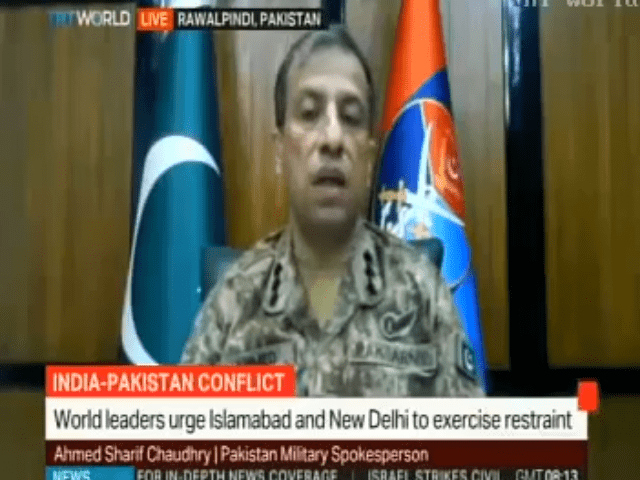Pakistan’s army has rejected the statements of India of cross -border strikes of drones and missiles, stating that he has only responded with small firefight to the bombardment of Indian artillery along the control line (LOC), and only against military objectives.
In an interview with Turkiye’s public broadcaster, the world of radio and television of Turkish (TRT World), the general director of Public Relations between Services (DG ISPR), Lieutenant General Ahmed Sharif Chaudhry, said the statements of India about the Pakistanis missiles and drone attacks in three Indian military bases were “manufactured” evidence.
“Pakistan has not triggered rockets, drones or missiles to the Indian territory,” said General Chaudhry. “What we are doing is responding with small firefire to Indian military posts aimed at civilians throughout the LOC.”
He added: “India has created a media bombardment, a frenzy, claiming attacks of airplanes, drones and missiles on the international border. That is absolutely false. There is no electronic signature, or captured pilots or evidence, only narration of media stories.”
DG ISPR reiterated that Pakistan is involving Indian military positions as a defensive response to Indian bombing that, according to him, has deliberately attacked civil populations.
“These are not offensive operations. Pakistan has not used drones or missiles,” he said.
India on Wednesday accused Pakistan of attacking military bases with drones and missiles, an accusation that Pakistan has strongly denied. DG ISPR said that in the current war, such attacks would leave electronic signatures and physical evidence, none of which India has presented.
The general also responded to the accusations surrounding the recent attack against tourists in Jammu and Kashmir (Iiojk) of Illegaly occupied, saying that perpetrators are still unknown.
“We have not shown any credible evidence to link the attack with Pakistan,” he said. “India moved away from the offer of independent and neutral investigation.”
He also accused India of using incidents such as political pretexts. “India has a pattern of use of terrorist incidents to justify aggression for internal political purposes,” he said.
“After Karzhan attack, instead of cooperating, India responded with strikes in six places in Pakistan, including mosques and civil sites, which resulted in the death of children, women and the elderly,” he added.
When asked about the possible economic repercussions, including the reports of the International Monetary Fund (IMF) that reviews the rescue of $ 7 billion of Pakistan, DG ISPR deferred, saying that such matters are under the domain of the Ministry of Economic Affairs and the Ministry of Foreign Affairs.
Latest tensions
The last climbing in the tensions between India and Pakistan follows the attack of April 22 in Pahalgam, India illegally occupied Jammu and Kashmir (Iiojk), which resulted in 26 deaths. India immediately accused the elements based on Pakistan to orchestrate the attack, although no evidence was provided. Islamabad has strongly rejected these accusations.
In retaliation, India closed the Wagah Earth border on April 23, suspended the Indo Water Treaty and revoked the Pakistani visas. Pakistan responded labeling any interruption of water flow as an “act of war” and closed the Wagah crossing on his side.
The situation intensified even more on Wednesday, as the reports of several cities in Pakistan, including Muzaffrabad, Kotli, Mueridke and Bahawalpur, detailed multiple explosions. Pakistan’s military spokesman, Lieutenant General Ahmed Sharif Chaudhry, confirmed that Indian air attacks had addressed multiple locations within Pakistan. In response, Pakistan released Swift Air and Ground Operations.
In the first hour of retaliation, Pakistan announced the fall of five Indian combat planes, including four Rafale aircraft, which India had recently acquired from France to strengthen its aerial defenses after the failed Balakot operation in 2019.
“Pakistan could have demolished 10 Indian combat planes,” said Lieutenant General Chaudhry during a press conference. “But Pakistan chose to exercise restriction.”
Despite the scale of the response, the Indian media remained silently on the losses. The Hindu, a prominent Indian newspaper, initially reported that three Indian planes had been demolished, but then eliminated the article, probably under the pressure of the Indian government to avoid more shame.
An American commentator about CNN declared that the potential loss of Rafale’s aircraft severely damaged the claim of India of aerial superiority, which had built around the induction of these advanced French combat planes. Some experts speculated that the confrontation served as a test of Chinese and Western military technologies, particularly after Pakistan acquired J-10c aircraft from China in response to the Indian rafale fleet.
A senior French intelligence official confirmed to CNN that a Rafale plane had been shot down by Pakistan, marking the first time that this sophisticated French plane had been lost in combat.
In another development, Pakistan’s armed forces confirmed the neutralization of 25 Israeli manufacturing Harop drones used by India in recent cross -border activity.
A statement issued by Public Relations between Pakistan Services (ISPR) confirmed on Thursday that these drones were demolished using both electronic countermeasures (soft slaughter techniques) and conventional armament (hard slaughter systems) after they were detected flying over multiple areas throughout Pakistan.
The ISPR described the drone raids as a “desperate and panic response” of India, which occurred after Pakistan retaliation operations on May 6 and 7, in which five Indian combat planes fell and several military positions fell.
Not immunate by the armed drones made by Israelis, called “Mero -Munitions”, sent by India in multiple cities of Pakistan, including Karachi, the residents of the Metropolitan City poured into the streets into an extraordinary wave of solidarity with the armed forces.
The number of Indian drones demolished by the Pakistani armed forces had reached at least 77, security sources confirmed on Friday.




